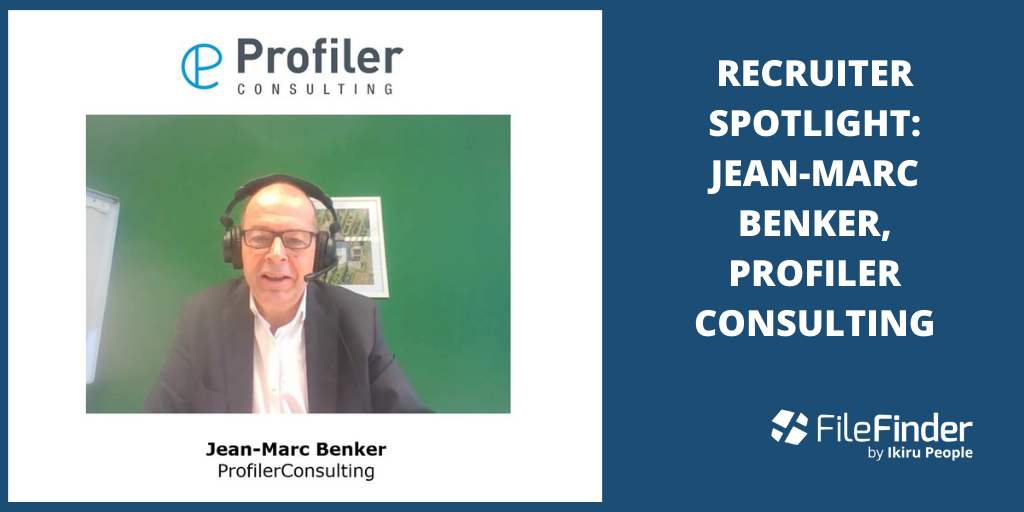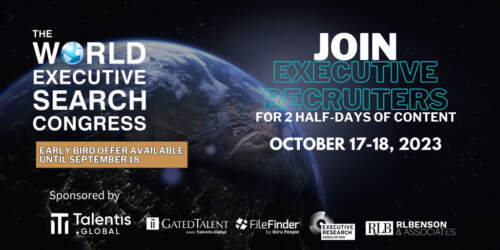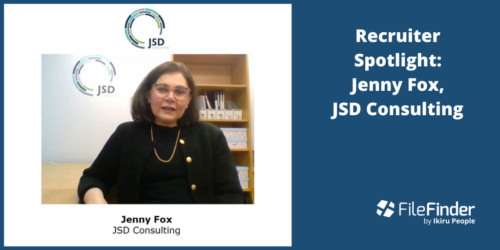In this Recruiter Spotlight, Margaret Jaouadi interviews Jean-Marc Benker, CEO and Founder of ProfilerConsulting, a privately owned Executive Search firm with offices in Belgium and Luxembourg, specializing in HR Consulting.
Jean-Marc has over 25 years of recruiting experience under his belt, advising medium and large organizations on various HR matters. Jean-Marc has also helped shape the executive search industry during his six-year tenure as president of the Belgium Executive Search Association and as a member of the board of European Federation of Search and Selection Associations.
Watch the video, or read the transcript below:
Welcome, Jean-Marc. Perhaps I can start by asking you, why did you choose a career in Executive Search?
I used to work in the industry before, in Financial Roles, and what I like about my job today is the variety of sectors that you can actually observe.
And for every client or prospect that we meet, I’m fascinated by their business model, by what makes them successful. Why do people want to buy their product or their service? What is their corporate culture? What are their values? And it can be a steel company one day and a bank the next one, or an airport, or an orphanage, and it’s the variety that is very interesting on the client side.
On the candidate side, it’s also very interesting because, as you know, every individual is unique… and you have an hour to take some helicopter view and look at someone’s career, and try to find a thread and some logic in the life choices the person made, understand what makes them tick, and see if that talent could be a potential match for one of our clients. So, I’m always going for the potential and the talent, and say, “OK, this person has something unique, and has something to add to the universe, or to humanity”.
I’m a talent seeker, or talent revealer, if you like to say so.
You have quite a lot of experience in Executive Search. What prompted you to start your own firm?
Well, I used to open several business units in business lines from my former employer – an office in Luxembourg and several other business lines in Brussels. And so, the logical next step was actually to take the entrepreneurial leap, and do it myself, not alone, obviously. There was three of us in 2007. And that was the logical next step in my destiny, if you want to say so.
I’m sure that you must have faced some challenges during your journey. What have you learned from them?
Actually, that as an entrepreneur, when you put your savings on the table to create a company, you’re in charge of everything. You cannot blame anyone. If anything goes wrong, you need to find a mirror, if you want to find the culprit.
But the successes are yours, too. People tend to see only the successes; they don’t see the sleepless nights when things are difficult. You need to take both parts of the job description.
So, you start with the business plan. And then actually have a reality check. It’s not always like it says in Excel or PowerPoint. Reality can have its own constraints and surprises, but I’m very thankful to my business school and the excellent professors I had, because they gave us the tricks of the trade, and also the pitfalls to watch out for.

When you are running an executive search firm, technology plays an important part and we are fortunate to call you our client for many, many years. What made you decide to invest in executive search software, and why did you choose FileFinder?
I used to be a financial controller for Siemens in my early years and I’m a bit of a fan of the “first time right” principle. So, if you want to do something, you do it properly or you don’t. So, putting clients or candidates in an Excel spreadsheet to me was a bit like an amateur approach. So, what we did in 2007 is that we had a long list of 10 potential software that could be useful; we boiled it down to three and FileFinder emerged out of it.
What I specifically like about FileFinder is the project management capabilities. Every recruitment is like a project, and what I like is to be able to look at a project and see is the percentage of completion, what stages we are in, and other milestones. And it also helps us to give some feedback on the client. Because the client gives us an assignment (usually retained) and then, after 2 or 3 weeks, they say, “OK, did they go on holiday with my money? Or is there anything happening here?”
And thanks to FileFinder and what it can produce in terms of data and reporting, we can give some feedback to the client and say, “look, this is what we’ve been doing in the meantime, it’s not because we’re silent that we’re not working for you, we can show you the matrix”. And so, they can expect some news, shortlist, or longlist from us within so many days.
Many executive recruiters compliment FileFinder for its reports. There is quite a lot of them available. But have you had any written for you in particular to fit your specific needs?
Yes, actually. There are existing reports, but we also developed our own ones. Some of them we developed on our own; for others we had to request some help from your tech guys.
We use them for portfolio management purposes, and for client reporting, but also for people management purposes internally. The team has some certain KPIs and targets to reach, and if things are recorded well, FileFinder can provide you with activity reports on both consultants and researchers.
And in monthly or quarterly reviews, it’s good to see where the figures are going, and if people are actually performing as they are supposed to.

So, basically, you are using reporting in FileFinder from both sides: as communication to clients on the progress of the assignments, and for your business reporting.
Exactly. On Monday mornings, we have a business review where we discuss all open assignments, and that’s very interesting, because there’s specific reporting with certain KPIs, and the consultant in charge, the researcher in charge, etc. And we go through all the assignments and have a status meeting on all of them to identify potential obstacles or opportunities, and the whole team can brainstorm on how to make progress.
And for me, it’s important to have the global picture and see on the perm side, how many assignments we have, what stages they are in. On the interim management side, how many interim managers we have on the field, with our clients, and for the advisory part, what the open advisory assignments are.
The last few months have been particularly challenging for everyone both personally and professionally. How did the pandemic affect you and your business?
I would be lying if I said that it hadn’t. A lot of our clients have issued hiring freezes. And so, that’s a bit difficult, especially on the perm side. The interim management side works well, and the advisory also, because some of our clients are requesting assistance in change management. And you can actually find a good interim manager to help them out in HR or finance or whatsoever, and to help them out in moving the existing structure and processes into something more agile.
These situations create opportunities for people to seek more efficient ways of working and technologies to support it. How did you find your preparation for that?
Well, we had the remote access licenses for FileFinder; we just had to find a few more laptops. And we had long discussions with the IT guys, because we need to be careful in terms of confidentiality and IT security. Logging in from home, you need to be careful about firewalls, and VPN access etc. That was a difficult thing to solve. Where do we draw the line? Because if everybody’s in the same office, you know about the firewalls and the security measures, but if you change those paradigms, you need to make sure that the data are still protected.

Do you have any advice for other search professionals looking to start their own businesses, particularly in such a difficult time? Many of them have been furloughed or perhaps took the opportunity to re-evaluate their life and take a leap. Do you have anything to say to them?
I would say that one should always favor quality over quantity. And the other thing is that we should never make any compromises in terms of ethics. If you respect those two things, and are client-centric enough, you will be successful. In our job, there are no shortcuts. You need to have it right every single time, and you are only as good as your last assignment.
Do you have any thoughts on the outlook for the Executive Search industry post pandemic?
I think there will always be a need for advice to find the famous needle in the haystack. Optimizing supply and demand on the labor market is an art, which needs a certain human touch. One should not be obtuse or obsolete. There are new tools available, like artificial intelligence etc, and we should tap on that.
And that is basically good news. Because it will make the early stages of search and recruitment more efficient, faster, probably even cheaper, and those are things we need to integrate and incorporate in our processes.
Now after that, assessing a senior leader’s soft skills, until now that’s not something that a computer can do. So there’s some added value in the human interaction and also in the understanding of the client’s needs and then their organization. Those are things that cannot be automated. We’ll see about the future, but I think that there’s some added value in terms of executive search. I’m not particularly worried about my professional future. The only challenge is how much of the new technology we integrate, and in what stages of the process. And that’s actually very fascinating. It’s like buying a new car.
Well, thank you very much, Jean-Marc, this has been really insightful and I wish you a lot of success in the future.
Thank you Margaret, for the invitation and a lot of success to you too.






